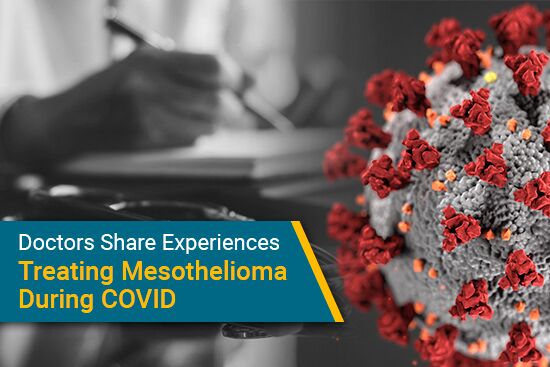Estimated Read Time: 3 minutes
The COVID‑19 pandemic has been a challenge for cancer patients. Many are anxious about going to a hospital for in‑person appointments. For some, such as people with thoracic cancers like mesothelioma, contracting the virus can lead to severe illness due to their cancer.
Doctors and specialists face challenges as well, navigating how to treat cancers like mesothelioma while keeping patients and staff safe.
“Because a lot of patients end up traveling, it has been an additional obstacle in regards to patients getting here,” said Dr. Shanel Bhagwandin, the Medical Director for the gastrointestinal surgery oncology program at Jupiter Medical Center in South Florida.
Changes in Case Volume During Crisis
For some mesothelioma cancer centers, the pandemic means fewer patients and cases. Dr. Brian Loggie, the Chief in the Division of Surgical Oncology at Creighton University Bergan CHI Medical Center, said COVID essentially halted his peritoneal mesothelioma program.
Not all programs are struggling to the same level. Dr. Joel Baumgartner is a surgical oncologist at Moores Cancer Center at University of California San Diego Health. He said COVID‑19 surges come and go, causing delays in cases at times.
“I think part of it is people have delayed health care for all kinds of things,” Dr. Baumgartner said.
Major Drop in New Cancer Diagnoses
A year ago, Mesothelioma Guide reported a drop in new cancer diagnoses during the pandemic. Six common cancers, including lung cancer, dropped 46% in new diagnoses during the early part of the pandemic. There were around 4,300 weekly diagnostic tests before the pandemic and only 2,300 during the first six weeks.
COVID seemed to be regressing during the spring of 2021. However, there was a summer resurgence as vaccinations stagnated. With loosening restrictions, more unvaccinated people are contracting the disease. Some areas of the country are reporting case and hospitalization numbers surpassing even the peak of 2020.
This has led to some cancer centers restricting access to family members. It’s a necessary, albeit unfortunate, precaution to keep staff and patients safe.
“It’s tough because of family,” Dr. Bhagwandin said. “A lot of patients want to have their family around. Where we are we haven’t been able to allow families in just within the past week due to the rise in Florida.”
Florida is one of the states facing the highest increase in COVID cases, hospitalizations and deaths. Fortunately, Dr. Bhagwandin said people still want to receive treatment, including surgery.
Virtual Medical Care Increasing in Pandemic
Some hospitals, like Jupiter Medical Center, are leaning more into telehealth options. They want patients to get updates on imaging tests without feeling the risk of coming into the facility.
Jupiter Medical Center isn’t the only one now implementing telehealth options.
According to a report at the 2021 World Conference on Lung Cancer, nearly two‑thirds of thoracic oncologists in a survey used telehealth for the first time during the pandemic. Nearly half the oncologists said telehealth is a permanent option for cancer centers.
Others already offered this feature but see more patients making use of it.
“We are still seeing cancer patients in the office with occasional telemedicine visits,” said Dr. Deepa Magge, head of peritoneal mesothelioma treatment at Vanderbilt University Medical Center.
“Our cases have continued to go on, despite COVID, given the urgency and time‑sensitive nature of them. There has been some hesitancy from patients having surgery because only one family member can stay with the patient at a time, but honestly, it hasn’t impacted my practice significantly.”
Dr. Baumgartner confirmed Moores Cancer Center “did zero video visits” pre‑pandemic. Now it’s a regular offering, probably even a permanent one, for out‑of‑area patients.
“We now have the infrastructure to be able to do that better. I think that’s one of the silver linings,” he said, noting operations require in‑person visits leading up to the date of surgery.
“We need to do a physical exam, for instance. There are things we can’t do remotely. (COVID) has certainly changed the landscape of how we practice, though.”
Sources & Author
- Almost two thirds of thoracic oncologists used telehealth for first-time during pandemic. Mirage. Retrieved from: https://www.miragenews.com/almost-two-thirds-of-thoracic-oncologists-used-630476/. Accessed: 09/13/2021.
About the Writer, Devin Golden
Devin Golden is the senior content writer for Mesothelioma Guide. He produces mesothelioma-related content on various mediums, including the Mesothelioma Guide website and social media channels. Devin's objective is to translate complex information regarding mesothelioma into informative, easily absorbable content to help patients and their loved ones.
Sources & Author
About the Writer, Devin Golden
Devin Golden is a content writer for Mesothelioma Guide. He produces mesothelioma-related content on various mediums, including the Mesothelioma Guide website and social media channels. Devin's objective is to translate complex information regarding mesothelioma into informative, easily absorbable content to help patients and their loved ones.
